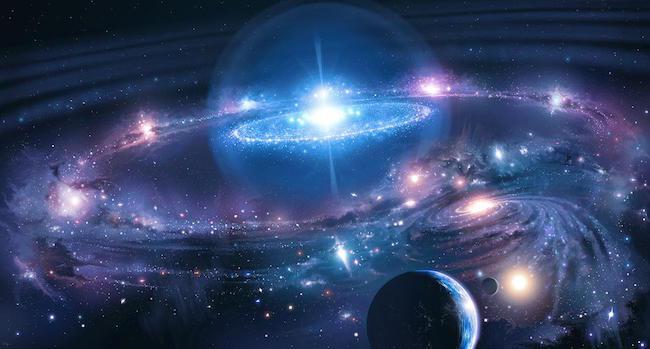Cosmology is the study of the universe. When we consider cosmology, we consider all the aspects of the universe, namely the past, the present and the future. In essence, cosmology deals with the origin, evolution and the ultimate fate of the universe. For a long time, man has been asking questions about the origin of the universe. How did we come into existence? Why did we come into existence? Has the universe always been there or did it form sometime in the past? If it did form, how did it form or who created it? What is our purpose in the universe? Does the universe have an end, or will it go on till infinity?
Men have tried to answer these questions in different ways. Some are accurate, whereas some are not. For example, there was one old woman who used to say that the universe consisted of thousands of elephants lifting the Earth. Modern cosmologists now say that the universe consists of billions of galaxies each of which has thousands and millions of stars. But why is the theory of modern cosmologists, more acceptable than the old woman’s theory of elephant?. The reason is simple, the second theory has been backed up by many observational evidences, whereas, the first theory has no observational evidences.
We have now seen that no random theory is selected to describe the universe. The theory put forth by any scientist should be backed by evidences, namely observational and mathematical. We didn’t accept the big bang theory or Einstein’s theory of relativity because it sounded cool. We selected them because we have observational evidences that suggest the same. For example, the presence of Cosmic Wave Background Radiation, which is the radiation present everywhere in the universe is suggestive of the big bang theory. Also, careful observation of gravitational forces, the recent discovery of gravitational waves and the characteristic yellow colour of gold are evidences of the validity of Einstein’s theory of relativity.
There is no big or small in cosmology. Cosmologists study both, the huge macroscopic objects, such as galaxies, black holes, planets etc, to really small particles (particles millions of times smaller than the atom).
As new discoveries are made, the existing theories are either validated, discarded or modified to suit the particular observation. For example, many people used to believe that the universe has been existing forever. This strictly is not possible due to two reasons: Firstly, a universe which has been existing for an infinite period of time would have seen an infinite number of stars. As a result, there would be a lot of light in the universe. In fact, the night sky would have been as bright as day if the universe had existed for an infinite time. Second, the presence of radioactive materials is a conclusive evidence that universe is not infinite because the radioactive nuclei of these atoms would have decayed and would have formed stable atoms.
The universe was initially a hot dense point of energy from which expansion started. Sounds familiar? If you are thinking of the title song of “The Big Bang Theory”, you are not alone. But turns out, it is quite true. The universe was initially a point of infinite density, something the cosmologists like to call as a singularity. Something triggered this point of infinite energy density, which caused it to expand very quickly. In fact, the expansion is still going on. Nowadays, singularities are only found in black holes.
There are many theories as to the possible end of the universe. Some say that the universe will keep expanding, whereas some say that expansion will eventually halt, owing to the gravitational attraction of the bodies and the start contracting back to where it started and again start expanding. Although the end of the universe in most theories will not happen for a few billion years, there is one theory which says that the universe can end this very instant. The theory of vacuum decay states that if our universe is not in a true vacuum, but in a false vacuum, the particles may suddenly move into true vacuum causing a chain reaction which will destroy the very basic chemistry of the universe.
The study of the universe is truly fascinating. The more we learn about the universe, the more apparent it becomes, how much we don’t know and how many secrets the universe has. The study of the universe will not end in the near future, but it will keep going on till the scientists come up with one theory which will describe all the aspects of the universe at the same time. Obviously, coming up with such a theory will take a lot of time, but in the end, that is when we will truly understand the universe and our role in it.

